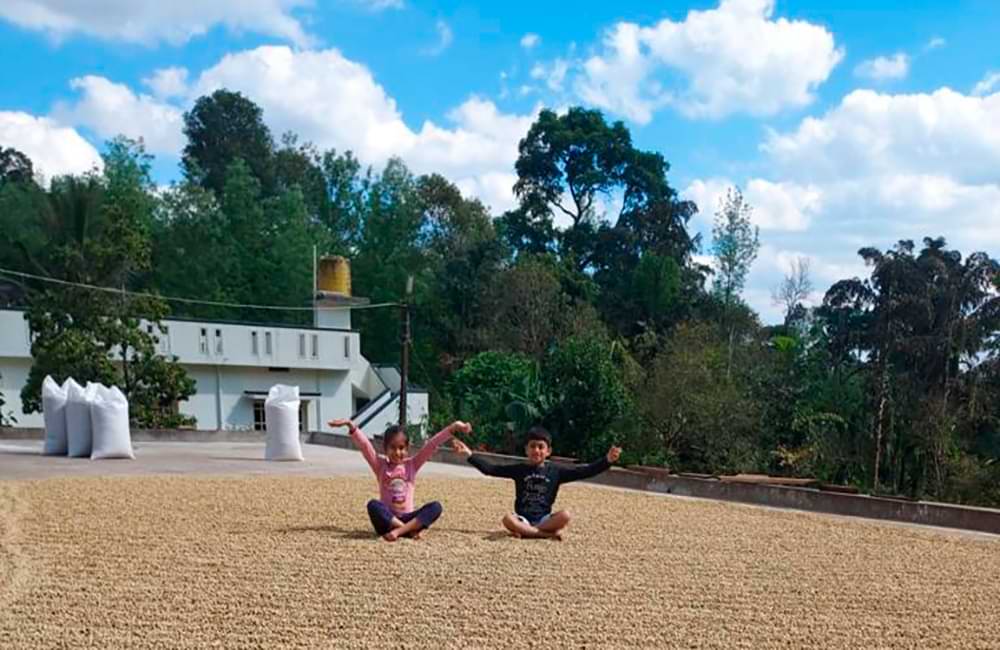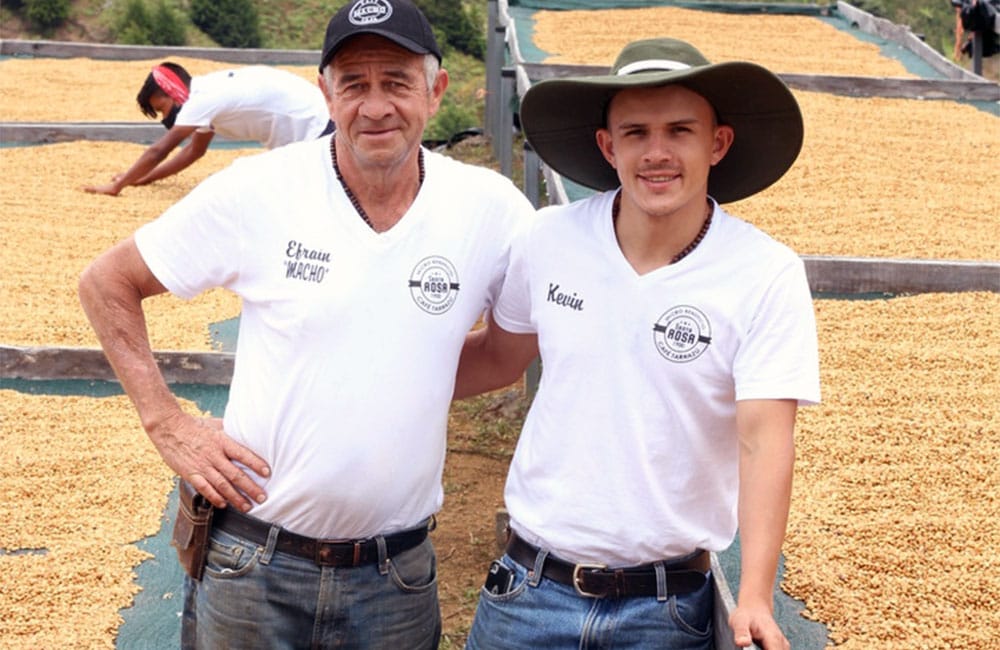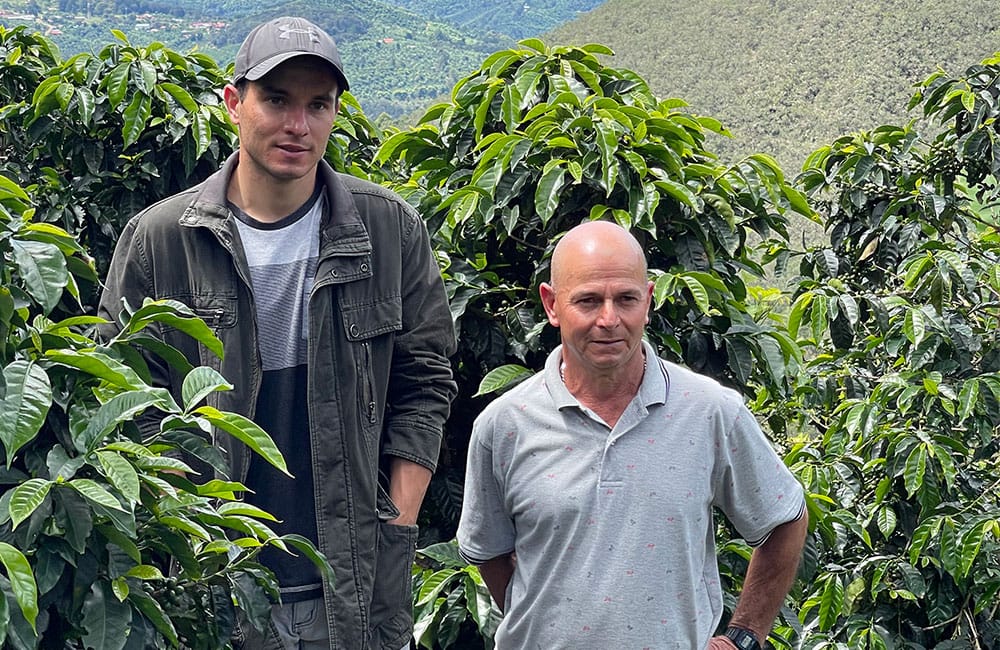Espresso
Cacao nibs, naranja, especiado
Baba Budangiri Hills |
|
1.100 msnm. |
|
S-795 |
|
Lavado |
|
Mr. Narendra |
|
Cosecha 2022 |

Café de India Meghal State
Meghal Estate es el nombre de una granja situada en las montañas de Baba Budangiri, en el sur de India. La granja tiene 60 hectáreas y se encuentra a una altura de 1100 metros sobre el nivel del mar.Los cafetos crecen a la sombra de más de 150 árboles diferentes, principalmente robles y cedros.
Los árboles ofrecen sombra a los cafetos, lo que hace que la maduración sea más lenta. También los protegen de las inclemencias del tiempo, como el viento, la lluvia y el calor extremo.
La sombra y las hojas secas de los árboles, que al descomponerse crean un compost natural, hace que no sea necesario el uso de fertilizantes químicos.
Las montañas de Baba Budangiri, y la finca Meghal Estate, son también hogar de gran variedad de animales salvajes, como los bisontes, los elefantes y los pavos reales.
Los cafetos se riegan con agua procedente de los manantiales de las montañas, gracias a las abundantes lluvias.
La historia del café de India
 Las montañas de Baba Budangiri deben su nombre a un Sufí del siglo XVI, venerado tanto por musulmanes como por hindús: Baba Budan.
Las montañas de Baba Budangiri deben su nombre a un Sufí del siglo XVI, venerado tanto por musulmanes como por hindús: Baba Budan.Baba Budan tiene un lugar especial en la historia del café puesto que se dice que fue el primero en romper el monopolio que entonces tenían los árabes sobre el cultivo de esta planta.
Este sabio Sufí realizó la peregrinación al Hajj en Meca. Después pasó por Yemen, probablemente como punto de partida de regreso a su tierra natal.
En Yemen probó la bebida de café, que era ofrecida a los peregrinos como tónico revitalizante en sus largos viajes.
Baba Budan reconoció de inmediato las delicias tanto gustativas como psicoactivas del café y quiso llevarse semillas de esta planta a India.
 En aquel entonces no se permitía la exportación de semillas verdes de café para mantener el monopolio que ostentaba Yemen de este cultivo y proteger así esta valiosa fuente de ingresos.
En aquel entonces no se permitía la exportación de semillas verdes de café para mantener el monopolio que ostentaba Yemen de este cultivo y proteger así esta valiosa fuente de ingresos.Pero Baba Budan, desafiando a las autoridades, escondió siete semillas. Hay quien dice que lo hizo en su larga barba y a quien dice que las escondió en su bastón.
Sea como fuere, una vez regresó a India, plantó las semillas en su tierra natal, la cual tenía y tiene unas condiciones ideales para su cultivo.
Desde entonces, esta región cuenta con más del 80% de toda la producción de café de India.
La finca Meghal Estate, un negocio familiar
Mr. Narendra es un caficultor de tercera generación. Su familia lleva cultivando café en esta finca desde 1890. En un país que predominantemente bebe café, esto no es una hazaña fácil.La finca Meghal Estate no solo produce un café excelente, sino que es un ejemplo de trato justo y sostenibilidad.
Los trabajadores de la finca cuentan con lugares dignos para vivir con sus familias, con agua y electricidad. También se les da comida, atención sanitaria, atención materna y otras necesidades básicas. Todo ello de forma gratuita.
 Además, por su localización y su forma de cultivo, basada en aprovechar los recursos naturales de forma responsable y mantener la biodiversidad, esta granja es un ejemplo de sostenibilidad.
Además, por su localización y su forma de cultivo, basada en aprovechar los recursos naturales de forma responsable y mantener la biodiversidad, esta granja es un ejemplo de sostenibilidad.En los últimos 6 años, Mr. Narendra, quien está a la cabeza del negocio familiar, se ha centrado en mejorar las técnicas y procesos de cultivo consiguiendo unos cafés de una calidad excelente.
El café de India de Meghal State es un ejemplo en la industria cafetera de este país.


El cultivo de café en la granja Meghal Estate
Los cafetos elegidos para los lotes de café de especialidad son de la subespecie Arábica y de la variedad S-795. Los cuales se tratan con un proceso de lavado. La temporada de cosecha es durante los meses de noviembre y diciembre. Durante la cosecha, las cerezas se recolectan a mano en tres rondas, seleccionando en cada ronda solo las que están en su punto óptimo de maduración y dejando el resto para la siguiente ronda. En la finca Meghal Estate se especializan en tratar sus cafés con el proceso de lavado clásico, este consiste en despulpar las cerezas una vez recogidas.
En la finca Meghal Estate se especializan en tratar sus cafés con el proceso de lavado clásico, este consiste en despulpar las cerezas una vez recogidas.Luego se levan y se ponen a secar al sol en camas elevadas. Los cafés se dejan reposar entre 30 y 40 días.
El mucílago de la cereza y la piel, recuperada después del proceso de lavado, se descompone con el uso de microbios naturales durante 90 días y luego se devuelve al suelo como fertilizante natural.
El café de India de Meghal State es un ejemplo de que, cuando las cosas se hacen bien y con pasión, los resultados son excelentes.









